Let me guess…
You’re passionate about making music, you’ve got a collection of tracks that could shake the music industry, but there’s just one problem: understanding everything there is to know about music licensing.
It feels like trying to read hieroglyphics, right?
Well, not anymore, because we’re going to guide you every step of the way.
I’ve been there, felt that confusion, and spent years deciphering the complex world of music licensing.
Now, as an experienced music producer, I’m here to help you navigate these waters smoothly.
In today’s article, we’ll be breaking down:
- The basics of music licensing ✓
- Why music licensing is crucial and how it benefits you ✓
- Tips on finding the right music publisher ✓
- Registering with a Music Rights Organization ✓
- Negotiating a music license agreement ✓
- Royalty-free music and stock music options ✓
- Music licensing agreements, like public performance licenses, blanket licenses & master use licenses ✓
- Actionable steps to harness the power of music licensing in your career ✓
Remember, understanding the business of music licensing is just as essential as creating your beats.
Don’t let the technicalities deter you or drive you crazy.
By the end of this journey, you’ll have the tools and knowledge you need to make music licensing work for you.
So, let’s dive in…
Table of Contents
Understanding Music Licensing
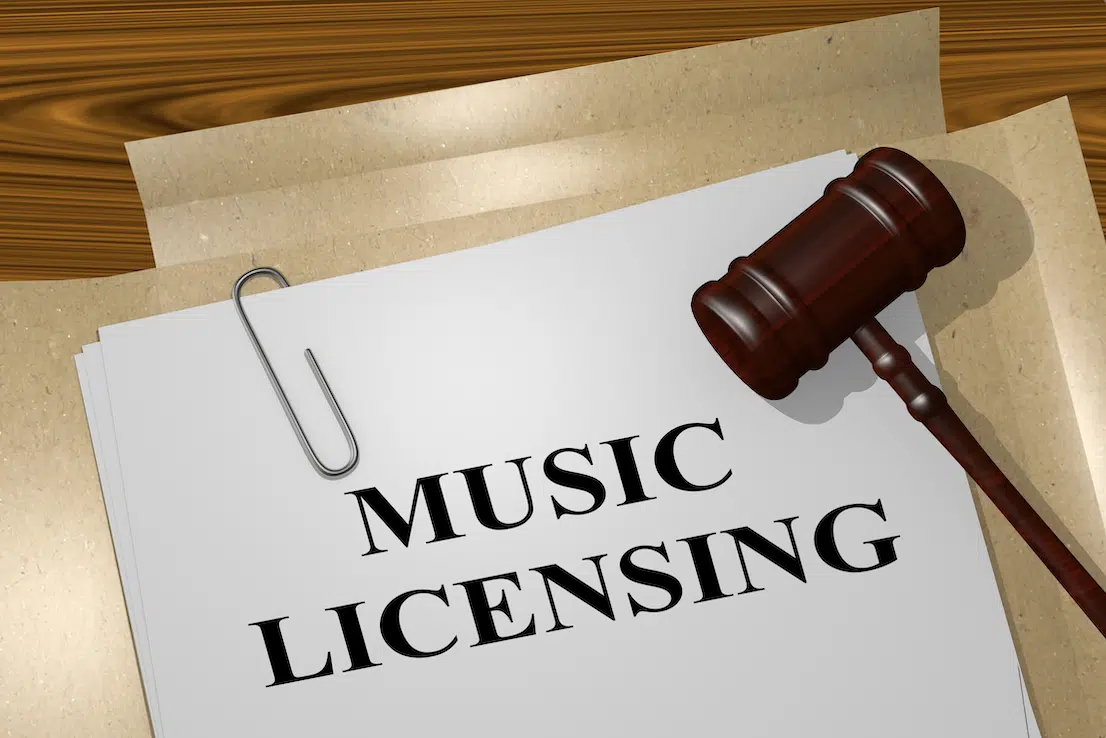
So what’s music licensing all about?…
Well, every time you write a song or craft a melody, you generate a set of rights.
This new song, your original creation, is now your intellectual property.
Music licensing is the legal process by which you grant permissions for the use of these rights.
You permit others to use your music, in a range of formats 一 be it in broadcast music for radio or TV, in a YouTube video, commercials, films, or even in a local cafe.
But why should you bother about music licensing? Well, because it’s super profitable, of course!
It’s a source of income, and often a pretty substantial one at that.
The licensee, say a filmmaker who wants your music for their movie, pays you a fee (often referred to as ‘royalty payments’) to use your masterpiece.
This way, they get to legally enhance their work with your music, and you earn from the application of your creativity.
Music licensing isn’t just about the money, though 一 it’s also about control.
You decide who gets to use your music and how.
This can help maintain the integrity of your work and your brand as a music producer.
-
The Role of Music Licensing in the Music Industry
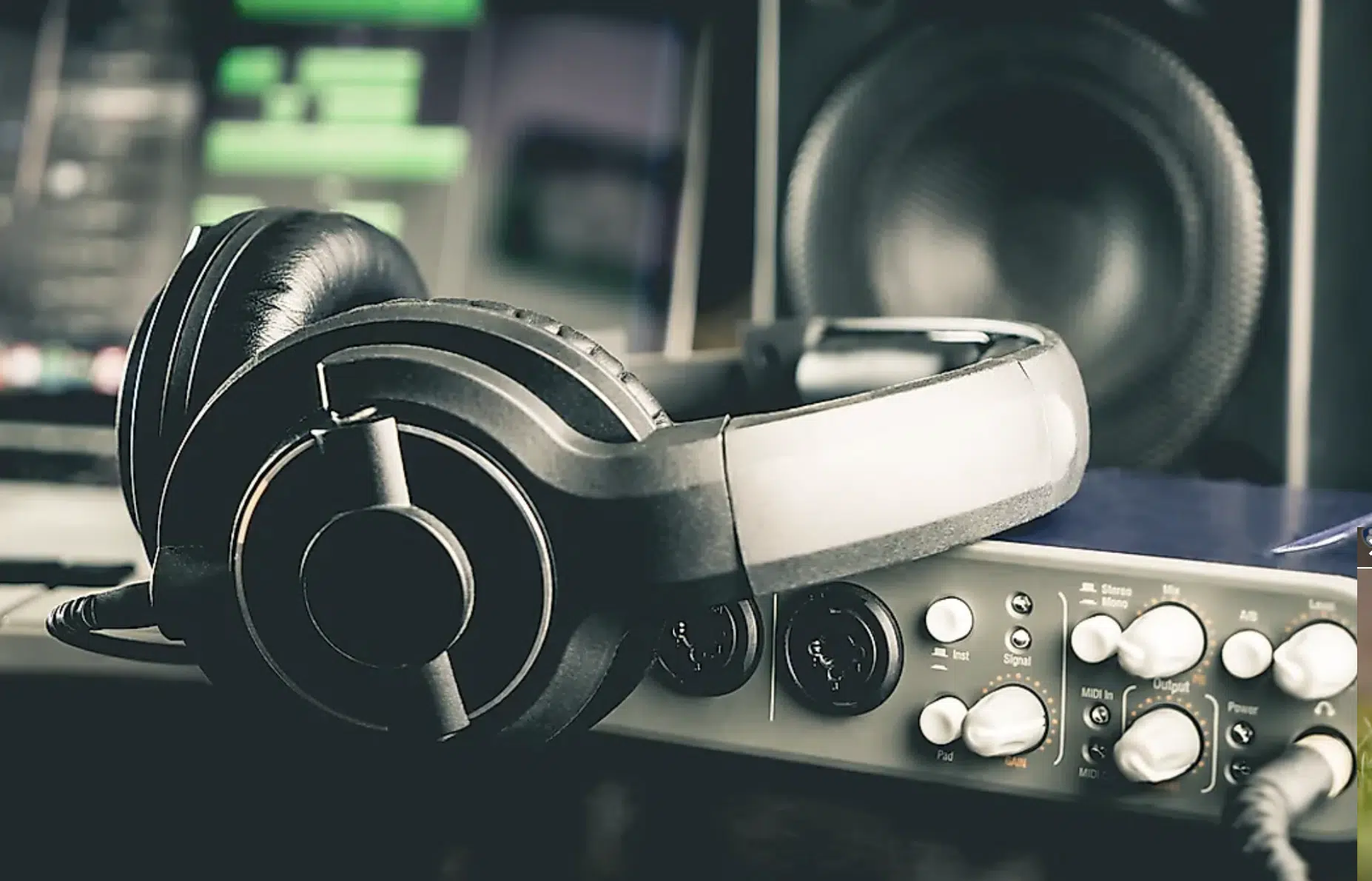
Now let’s dig a little deeper into the music industry and record labels for a minute.
Here, music licensing isn’t just a peripheral component 一 it’s central to the business.
It’s how musicians make money beyond just selling albums or streaming on Spotify.
Take copyrighted music, for instance… a copyright owner holds exclusive rights to their music.
If a company wants to use a copyrighted song in an ad, they can’t just take it; they need to get a music license.
The same applies to radio stations, TV shows, films, and even YouTube videos.
By understanding and leveraging music licensing, you open up new avenues for revenue.
This is why, as a music producer, understanding music licensing is paramount.
So you see, music licensing is not just about understanding your rights but also about recognizing new and exciting opportunities.
It’s about seeing where your music can fit and how you can profit from it.
-
How Does Licensing Music Affect You?
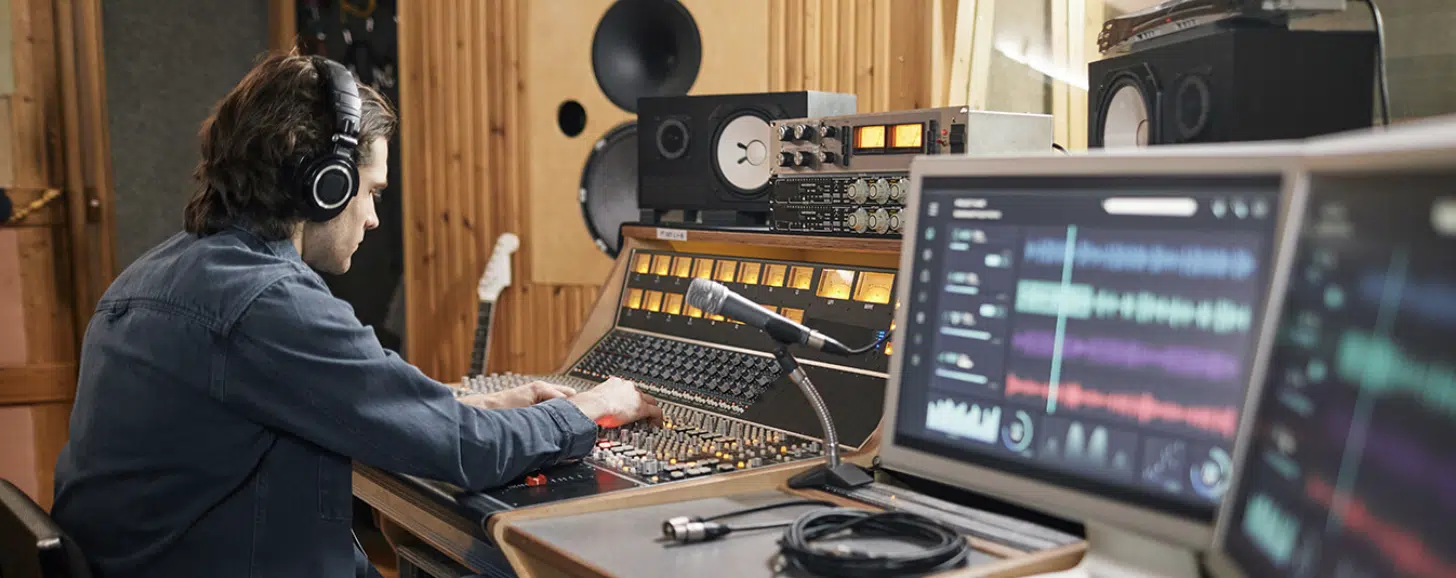
Now, what does all this mean for you, a digital music producer?
Quite a lot, actually.
Music licensing is your gateway to monetizing your work beyond just selling albums or earning from live music performances.
For instance, consider sync licenses.
These licenses allow your music to be ‘synchronized’ with visual media, like film or video games.
Imagine hearing your unique beats on the big screen or while someone’s playing their favorite video game.
That’s what sync licensing can do.
It can put your music in places you might not have imagined. Plus, each time it plays, you earn a royalty.
Then there’s broadcast music… each time your music is played on radio or TV, it’s being ‘broadcasted’.
And for every broadcast, you’re due a royalty.
To make sure you receive this, you would work with rights organizations who collect these royalties on your behalf.
Lastly, think about the breadth of licensing.
Your music can be anywhere 一 from a local coffee shop to a blockbuster movie.
Each one of these is a chance for you to earn, a moment for your music to shine, and a stepping stone in your journey as a digital music producer.
It’s an opportunity you most certainly do not want to miss.
The Ins & Outs of Rights and Licensing Agreements
Navigating the music industry is like finding your rhythm in a new song or sound recording.
It might seem complex at first, but once you understand the nuances, everything falls into place.
So let’s tune into the melody of rights and licenses in the music industry.
-
A Closer Look at Copyrighted Music
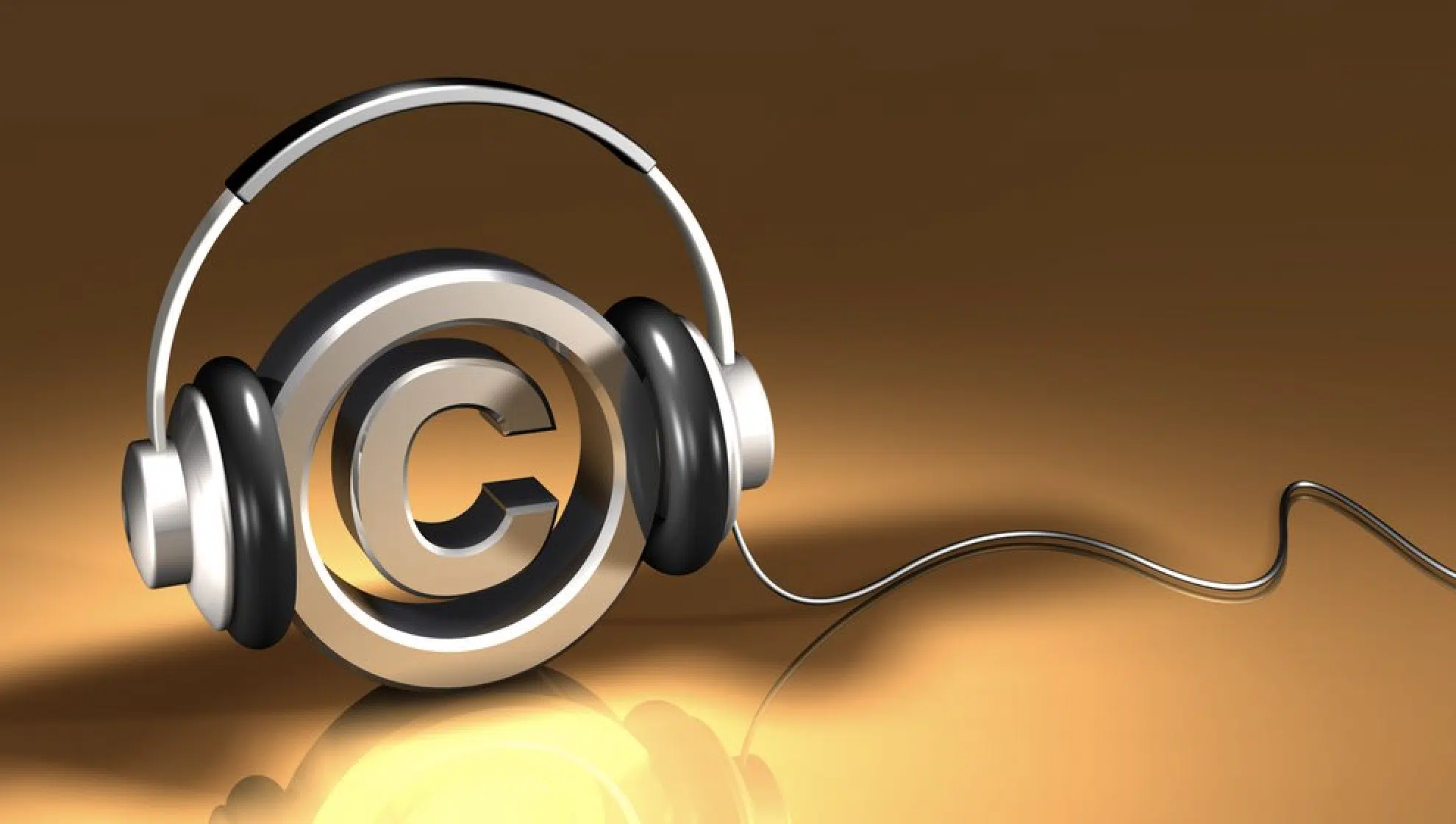
In the music world, the moment you hit that record button, you’ve got copyrighted music in your hands.
The music you’ve just recorded, the original song that you’ve crafted, automatically earns copyright protection under law.
You’re now a copyright holder, so what does this mean?…
Being a copyright holder gives you the exclusive right to determine who can reproduce, distribute, perform, or display your work.
Any unauthorized use can lead to copyright infringement, a legal offense that carries heavy penalties.
So, your copyrighted music is not just a professional song; it’s an asset, a valuable one.
Licensing your copyrighted music lets others legally use it while ensuring you retain your rights.
In essence, you’re renting out your music.
Whether someone wants to play it in a coffee shop, a radio station, or in a film, they’ll need to acquire a license from you, the copyright owner.
-
The Complexities of Music Rights Organizations
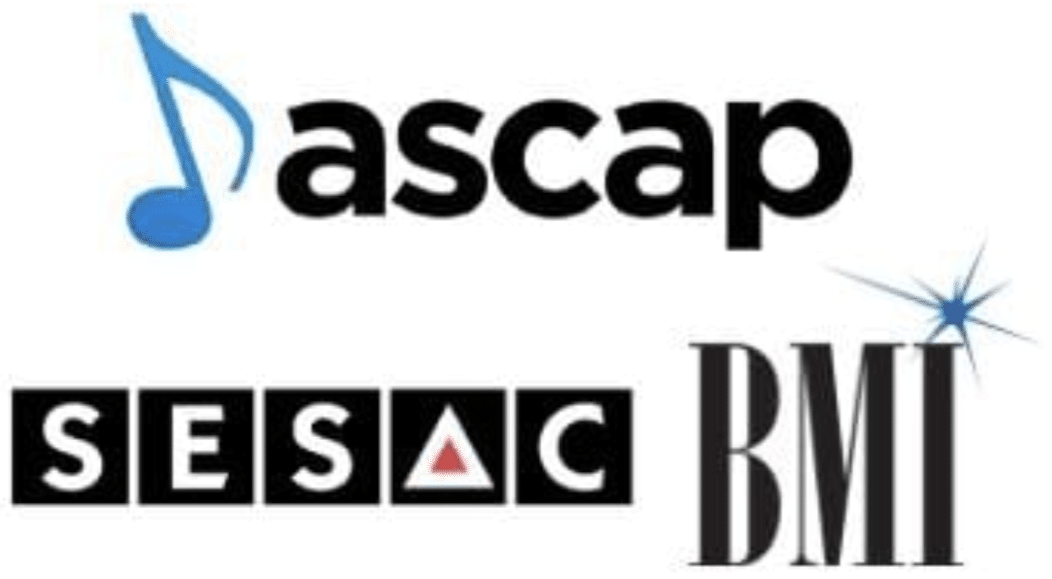
Music rights organizations, also known as performing rights organizations, play a pivotal role in music licensing.
These are the bodies that make sure you, the music producer, get paid when your music is played publicly – whether in a shopping mall, on radio, or on a TV show.
Being a part of a music rights organization can take a lot of the legwork off your plate.
They track where and when your music is performed publicly, collect the royalties from these performances, and then distribute them to you.
It’s their job to ensure that your hard work doesn’t go unnoticed and, most importantly, uncompensated.
Examples of music rights organizations include:
- ASCAP (American Society of Composers, Authors and Publishers)
- BMI (Broadcast Music, Inc.)
- SESAC (Society of European Stage Authors and Composers)
Joining one of these can be a smart move as a music producer.
They have the expertise, the connections, and the systems in place to ensure that you receive your dues.
Deciphering the Different Types of Music Licenses
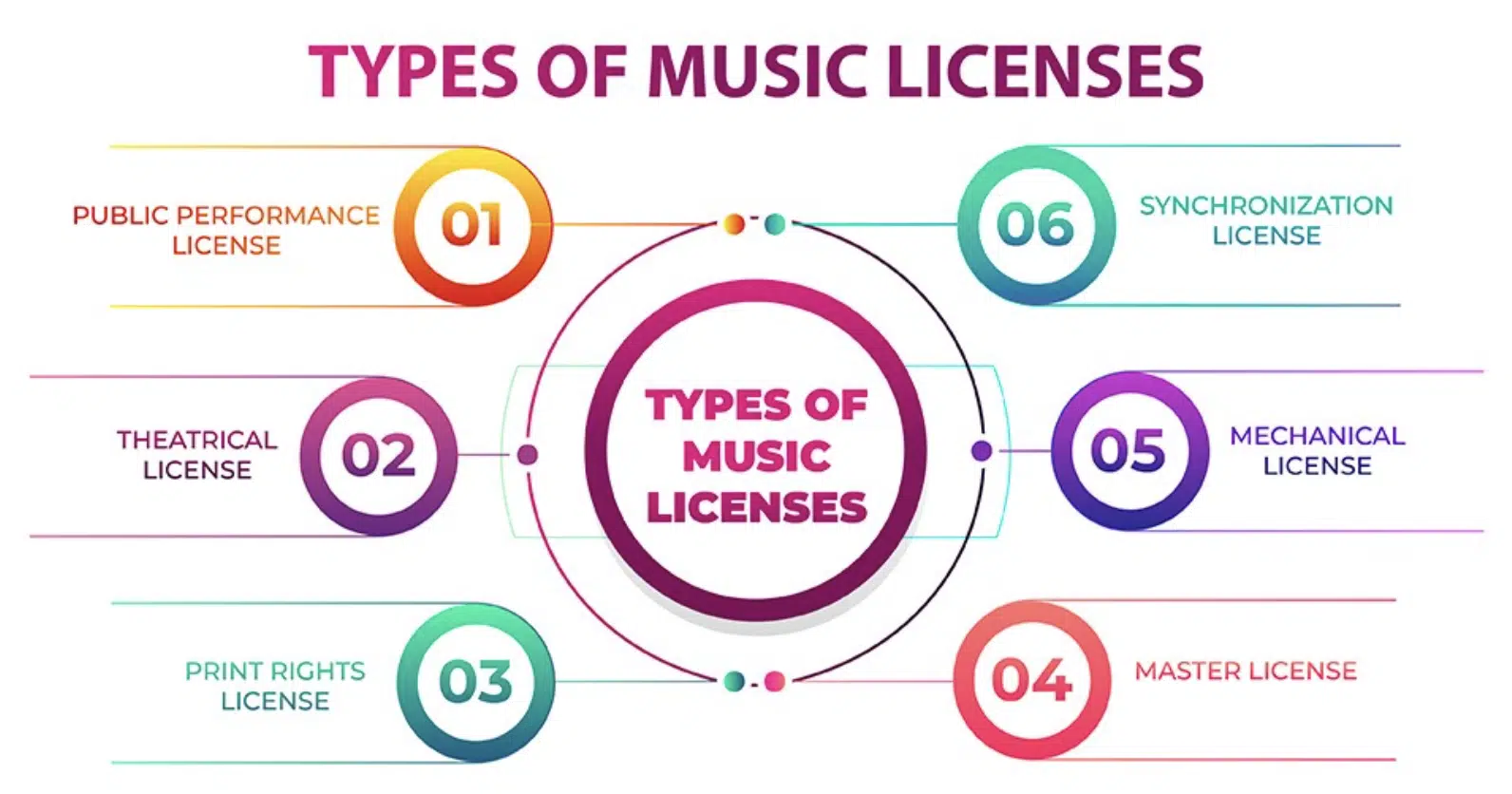
In the world of music licensing, one size does not fit all.
Different uses of your music require different types of licenses.
Understanding these types can ensure that you’re being fairly compensated and that your music is being used properly.
1. Sync Licenses
First up is the sync license. When you’re attempting to sample music or license music, sync license lets your music be ‘synchronized’ with visual media.
So, if a filmmaker wants to use your music in their movie, they’ll need a sync license from you.
The same applies to TV shows, video games, and even YouTube videos.
And remember, every single time your music plays, you get paid.
2. Master Licenses
Next is the master license… and this one’s a bit different.
A master license gives permission to use a specific recorded track of your music.
This means that they’re not just using your song, but your version of it, your master recording.
Let’s say a TV show wants to use your actual recording in an episode… they’ll need a master license from you first.
3. Public Performance Licenses
Then we have public performances licenses. These licenses give the right to play music in public places.
Whether it’s a cafe playing your song or a DJ spinning your tune at a local nightclub, they’ll need a public performance license from you.
The beauty of this is that these licenses can lead to ongoing royalties, as every play is a paid play.
One thing to note is that a public performance license doesn’t allow the licensee to reproduce or distribute your music 一 that would require a completely separate license.
It’s important to understand the scope and limitations of each type of license to protect your music and your rights.
4. Broadcast Licenses
Broadcast licenses are another type of music license.
This covers the playing of your music on broadcast channels like radio and TV.
The more your music gets played, the more you earn.
It’s not unusual for a popular song to rack up significant earnings from broadcast licenses alone.
5. Blanket Licenses
This is a type of license that gives the licensee the right to play, or upload any song in a music rights organization’s repertoire for a set fee.
It’s like an all-you-can-eat buffet, but for music.
This is great for entities like radio stations or TV networks that play a lot of music and need a cost-effective and convenient licensing solution.
This is a win-win situation for both parties.
As a music producer, a blanket license can generate consistent revenue over a certain period.
For the licensee, it simplifies the licensing process as they don’t have to obtain individual licenses for each song they want to use.
However, the terms of a blanket license can vary greatly.
It’s crucial to read the fine print and understand exactly what rights are being granted before entering into a blanket licensing agreement.
6. Mechanical Licenses
Mechanical licenses grant permission to reproduce and distribute copyrighted musical compositions (songs) on:
- CDs
- Records
- Tapes
- Ringtones
- Permanent digital downloads
- Interactive streams
- Other digital configurations
If you’re recording and distributing cover songs, a mechanical license is essential.
7. Theatrical Licenses
Theatrical Licenses, also known as “grand rights,” are required when a piece of music is used as part of a dramatic performance, such as a musical, opera, play, or ballet.
A theatrical license is necessary when the music contributes to the storyline or the development of the characters.
8. Print Licenses
Print licenses come into play when someone wants to reproduce and distribute sheet music for a song.
This could be anything from a full orchestral score to a simple guitar tablature.
If your song gets popular and there’s a demand for the sheet music, a print license ensures that you get a cut of the sales.
Maximizing Your Profits: Effective Strategies for Music Licensing
Creating music is your passion, and it’s even better when you can profit from your creativity.
Let’s explore some strategies to help you maximize your earnings from music licensing.
-
The Power of Royalty-Free Music
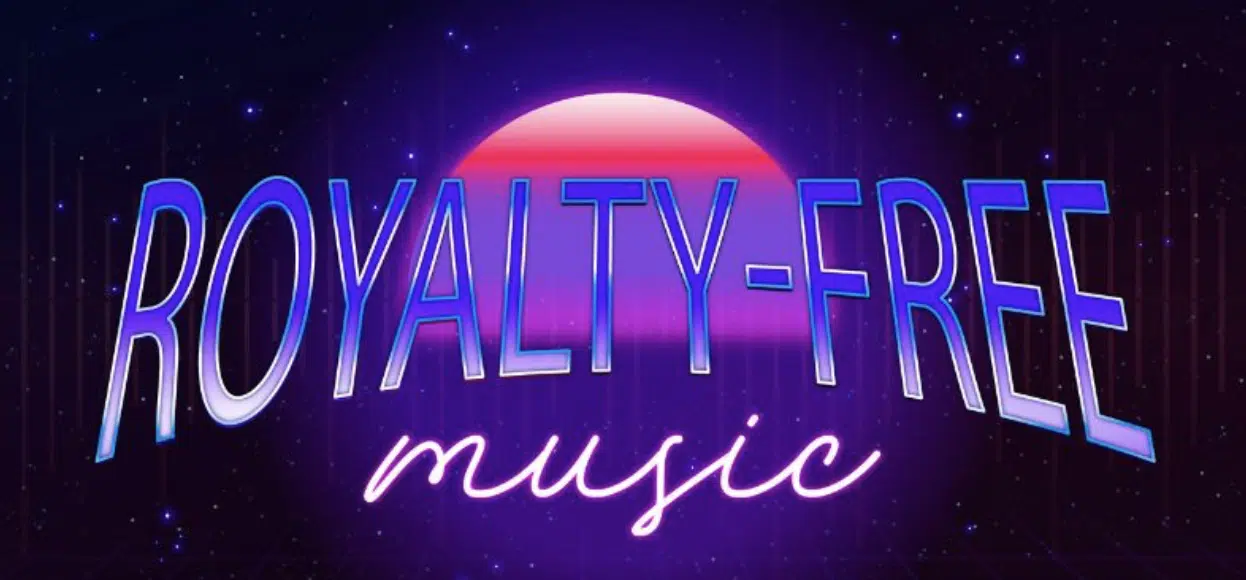
Royalty-free music is a kind of music licensing where the buyer pays a one-time fee to use your music as much as they want.
It’s ‘free’ of ongoing royalties, hence the term ‘royalty-free.’
While this might seem less appealing than licenses that pay per use, it has its benefits.
Royalty-free music is appealing to buyers
It’s simple, convenient, and cost-effective, especially for those who need to use music frequently or in multiple projects.
This can make your music more marketable, leading to more sales.
Royalty-free music can provide a steady, predictable income stream
Since buyers pay upfront, you get your money right away. No need to wait for those royalty payments to trickle in.
This can be particularly beneficial if you’re just starting out in music production and need a more immediate return on your work.
Also, consider offering a portion of your music catalog as royalty-free music.
This can help attract a wider audience and generate more sales.
-
Leveraging Stock Music Platforms
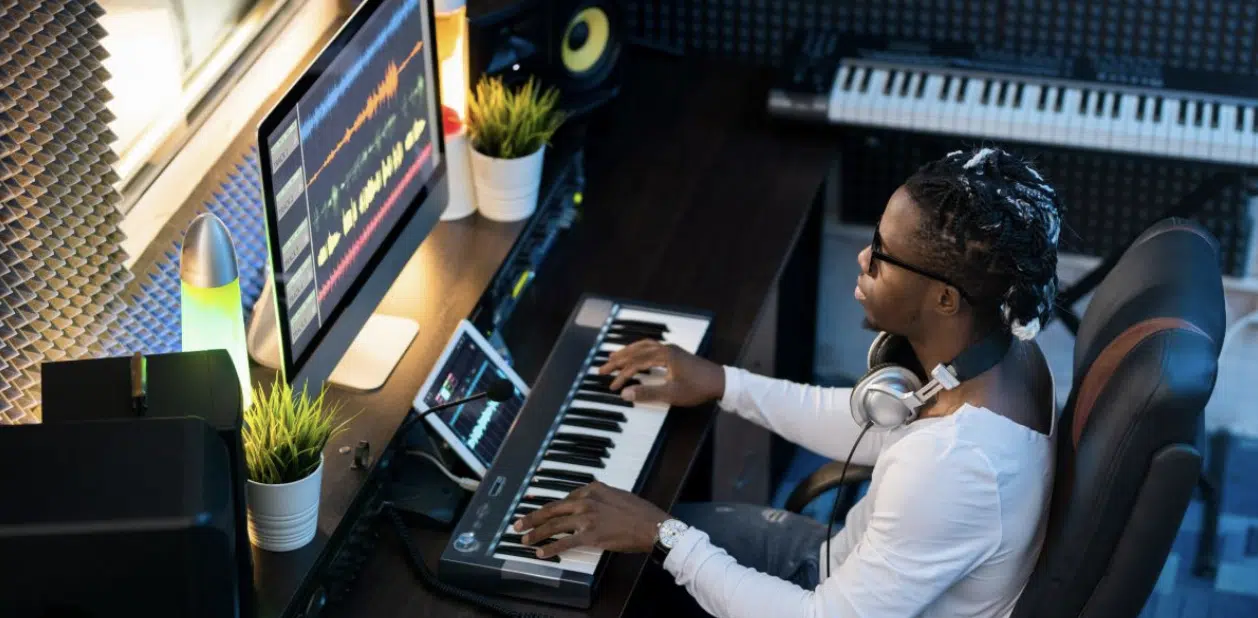
Stock music platforms, like AudioJungle or PremiumBeat, are marketplaces where you can sell your music licenses.
As a music producer, these platforms can be a powerful tool for monetizing your work.
When you sell your music on a stock music platform, you’re making it available to a global audience.
Filmmakers, advertising agencies, video game developers 一 they all turn to stock music platforms to find the perfect song for their projects.
So by listing your music here, you’re increasing its visibility and potential for sales.
One key aspect of these platforms is their categorization and search functionality.
When you upload your music, you’ll tag it with relevant keywords (like “uplifting,” “melodic,” or “hip-hop“).
This makes it easier for buyers to find your music when they’re searching for something specific.
However, keep in mind that most of these platforms work on a royalty-free basis.
This means that you’ll typically earn a flat fee for each license sold, rather than ongoing royalties.
Be sure to read and understand the platform’s licensing terms before you start selling.
Always remember, quality matters just as much as quantity.
Your stock music tracks should be professionally produced, unique, and appealing to a wide range of content creators.
-
Securing the Rights to Master Recordings with a Master Use License
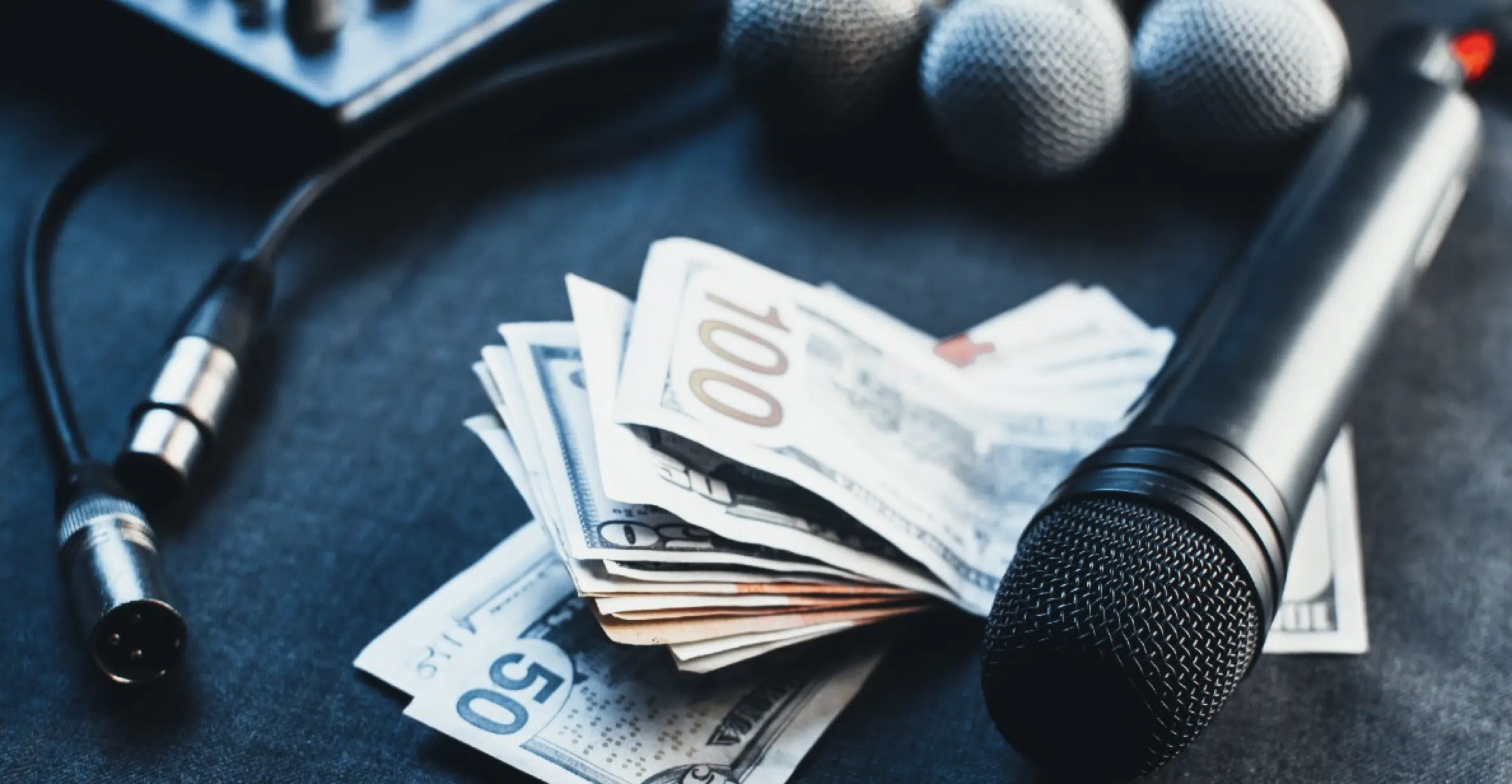
A master use license gives the licensee the right to use a specific recorded version of a song in a visual media project 一 think movies, TV shows, or commercials.
This is separate from the synchronization license, which covers the rights to the underlying composition.
The master use license is typically granted by the record label or whoever owns the rights to the master recording.
As a music producer, this could be you if you’re independently producing, mixing, and releasing your music.
Having a master use license can be lucrative, particularly if your music is being used in high-profile media projects.
However, it’s crucial to ensure that the terms of the license are fair and protect your interests.
The Road to Music Licensing Mastery
Unlocking the world of music licensing isn’t a simple stroll… it’s more like embarking on an exciting journey.
There are critical stages along this road, and knowing what to expect will give you a head start.
So, how do you master the art of music licensing?
It starts with:
- Finding a solid music publisher
- Understanding the ins and outs of music rights organizations
- Negotiating the perfect music license agreement
In this section, we’ll explore each of these stages, offering insider insights and practical tips to help you on your journey towards music licensing mastery.
It’s all about making smart moves in a complex field 一 and that’s exactly what I’m here to help you with.
-
Partnering with the Right Music Publisher
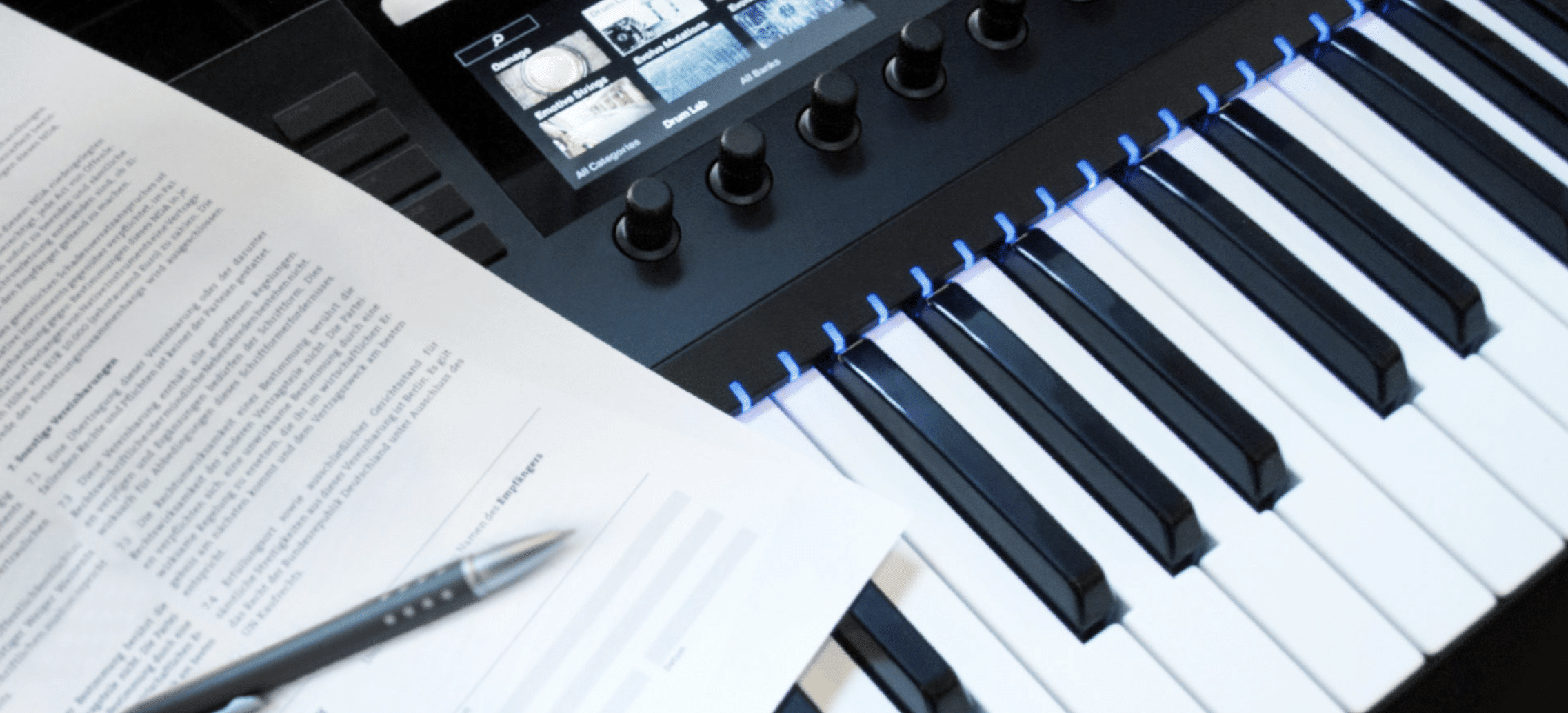
Music publishers are like your super-powered allies in the music industry.
They handle a vast array of tasks, including negotiating licenses, collecting royalties, and promoting your music.
In return, music publishers take a cut of your earnings.
This might seem like a downside, but if they’re doing their job well, they’ll increase your earnings enough to make it worthwhile.
Choosing the right music publisher can make a significant difference in your music career.
A good publisher has the right contacts in the industry, understands your music, and knows where and how to place it for the best returns.
The right publisher also stays on top of changes in the music industry and advises you accordingly.
So, how do you choose the right publisher? Research, research, and then more research.
Look at the publisher’s track record, ask for testimonials, and seek advice from fellow producers and artists who have worked with them.
And, most importantly, find one that aligns with your personal goals and views as a music producer.
Remember, a great music publisher will not only manage your music licenses but will be a proactive partner in your career.
-
Registering with a Relevant Music Rights Organization
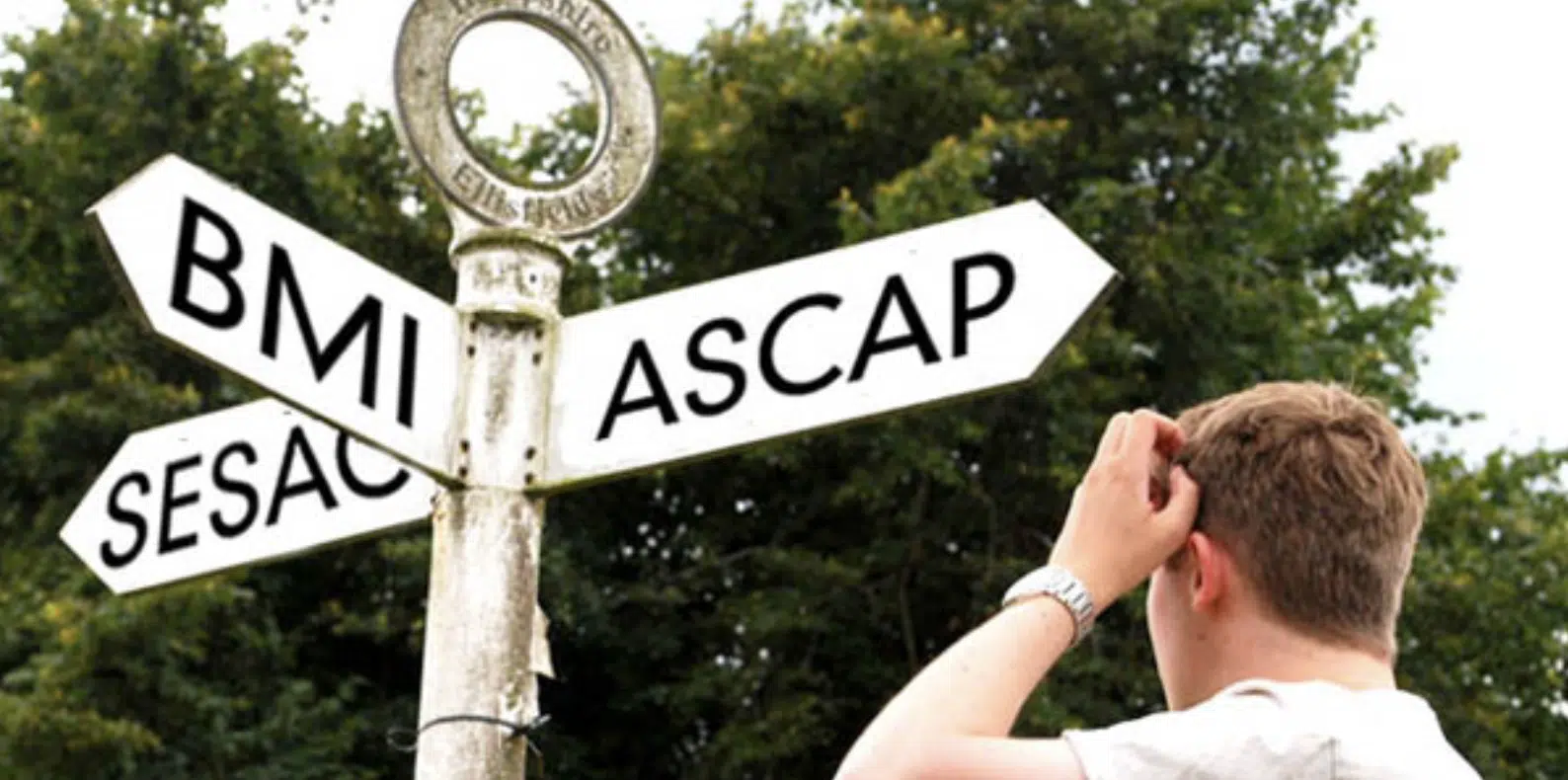
Music rights organizations (MROs) are another crucial part of your licensing journey.
They protect your rights as a music producer, ensuring that you are properly compensated when your music is performed or played publicly.
Different MROs cater to different rights and regions, so it’s essential to register with one that’s relevant to your music and target audience.
For instance, if you produce broadcast music, you need an MRO that has a strong presence in the broadcasting sector.
Registering with an MRO involves providing information about your music, including copyright details and the rights you hold.
The MRO then uses this information to collect royalties on your behalf.
This is a critical step in ensuring that you are paid for the use of your music.
-
Negotiating the Perfect Music License Agreement

Negotiating a music license agreement can feel like navigating a maze.
There are multiple parties involved, each with their own interests, and the terms can get complex… but fear not!
With a bit of knowledge and preparation, you can negotiate a license agreement that’s fair and beneficial to you.
First 一 Understand what each type of license involves.
For example, a master license gives the licensee the right to use a specific recorded version of the same song, while a sync license permits them to pair your music with visual media.
Second 一 Be clear about what you want from the agreement.
This could include things like the scope of the license, the royalty rate, and the duration of the agreement. Don’t be afraid to negotiate these terms. Remember, you are always in control of your recorded music, never settle for less.
Lastly 一 Always have an entertainment lawyer review the agreement before you sign.
They can help you identify any potential issues and ensure that the agreement is in your best interest.
Remember, the perfect music license agreement is not just about getting your music out there; it’s also about protecting your rights and ensuring you are fairly compensated.
Music Licensing: Final Thoughts
From decoding music licenses to understanding the future trends of music licensing, we’ve delved into every facet to give you a complete picture.
But remember, knowledge is power only when it’s put to good use…
So, let’s get those gears turning, apply this newfound understanding, and make waves in the music industry.
But hey, amidst all this licensing talk, let’s not forget the simple pleasures of creating music, right?
One way to keep things hassle-free is to utilize music packs that are guaranteed to be copyright and royalty-free.
It saves you from worrying about music licensing and lets you focus more on what you love: producing music.
A perfect example is this 100% copyright- and royalty-free beatmaker box (free teaser), that contains some of the most epic loops in the game.
This all-inclusive pack gives you the freedom to create without the licensing headaches, as everything included is copyright and royalty-free.
Not only does it provide high-quality sounds, but it also empowers you to create, experiment, and produce without any restrictions.
In the end, whether you’re diving headfirst into music licensing or leaning towards royalty-free packs, always remember that your creativity is the most important thing.
Stay true to it, and let your music speak volumes.
Until next time…






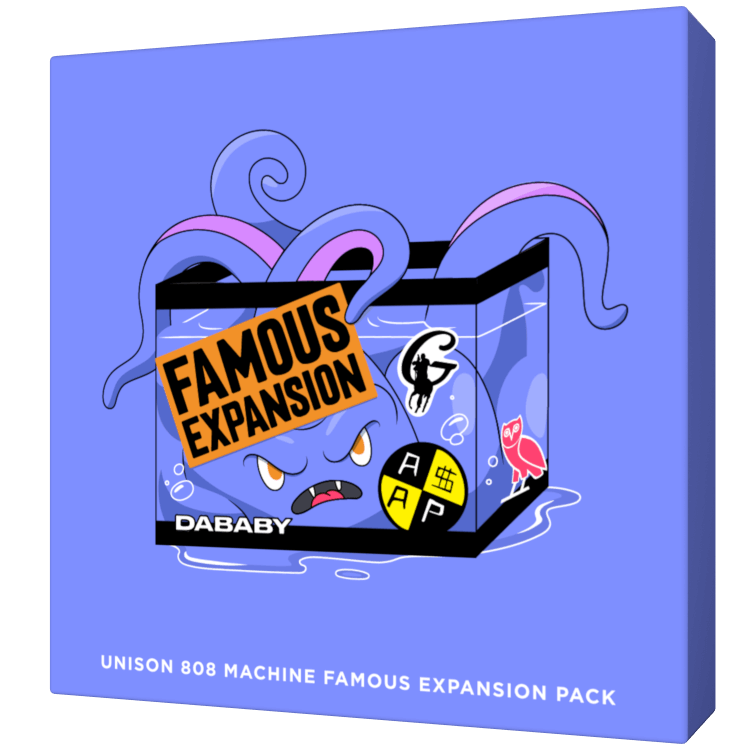
Leave a Reply
You must belogged in to post a comment.